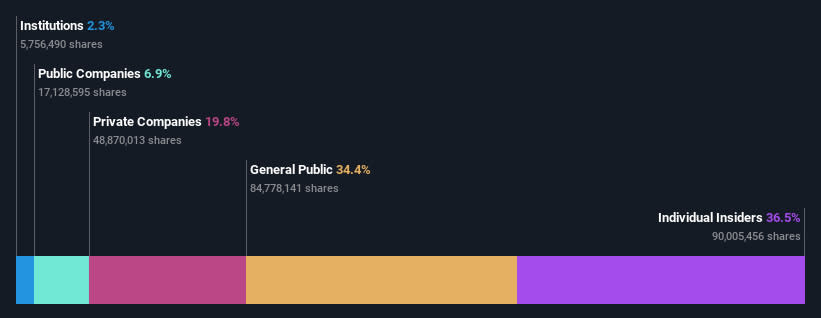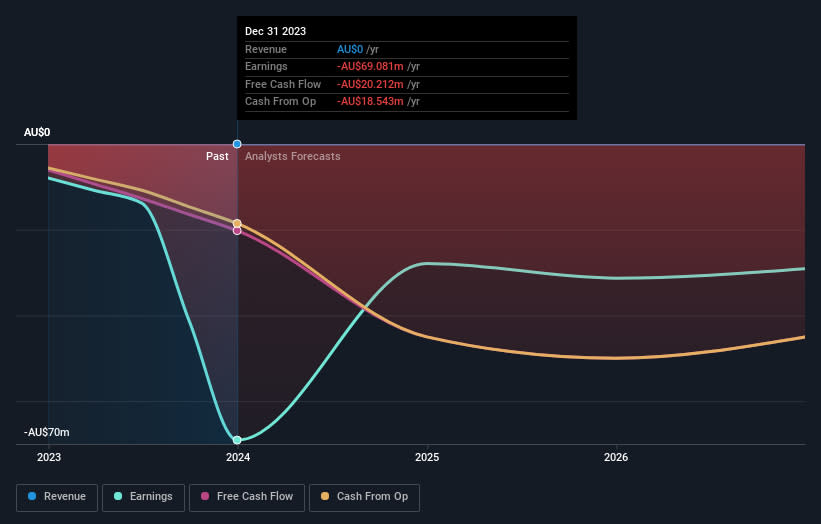Sports
With 37% ownership, Brazilian Rare Earths Limited (ASX:BRE) insiders have a lot riding on the company’s future

Key Insights
-
Insiders appear to have a vested interest in Brazilian Rare Earths’ growth, as seen by their sizeable ownership
-
A total of 7 investors have a majority stake in the company with 56% ownership
-
Ownership research, combined with past performance data can help provide a good understanding of opportunities in a stock
A look at the shareholders of Brazilian Rare Earths Limited (ASX:BRE) can tell us which group is most powerful. With 37% stake, individual insiders possess the maximum shares in the company. In other words, the group stands to gain the most (or lose the most) from their investment into the company.
So, insiders of Brazilian Rare Earths have a lot at stake and every decision they make on the company’s future is important to them from a financial point of view.
In the chart below, we zoom in on the different ownership groups of Brazilian Rare Earths.
Check out our latest analysis for Brazilian Rare Earths
What Does The Institutional Ownership Tell Us About Brazilian Rare Earths?
Institutional investors commonly compare their own returns to the returns of a commonly followed index. So they generally do consider buying larger companies that are included in the relevant benchmark index.
Institutions have a very small stake in Brazilian Rare Earths. That indicates that the company is on the radar of some funds, but it isn’t particularly popular with professional investors at the moment. So if the company itself can improve over time, we may well see more institutional buyers in the future. We sometimes see a rising share price when a few big institutions want to buy a certain stock at the same time. The history of earnings and revenue, which you can see below, could be helpful in considering if more institutional investors will want the stock. Of course, there are plenty of other factors to consider, too.
We note that hedge funds don’t have a meaningful investment in Brazilian Rare Earths. Looking at our data, we can see that the largest shareholder is Kuda Huraa Mining Ventures And Global Investments Corp with 11% of shares outstanding. Todd Hannigan is the second largest shareholder owning 10.0% of common stock, and Bernardo Sanchez da Veiga holds about 7.1% of the company stock. Note that the second and third-largest shareholders are also Top Key Executive and Member of the Board of Directors, respectively, meaning that the company’s top shareholders are insiders.
We did some more digging and found that 7 of the top shareholders account for roughly 56% of the register, implying that along with larger shareholders, there are a few smaller shareholders, thereby balancing out each others interests somewhat.
While studying institutional ownership for a company can add value to your research, it is also a good practice to research analyst recommendations to get a deeper understand of a stock’s expected performance. While there is some analyst coverage, the company is probably not widely covered. So it could gain more attention, down the track.
Insider Ownership Of Brazilian Rare Earths
The definition of an insider can differ slightly between different countries, but members of the board of directors always count. Management ultimately answers to the board. However, it is not uncommon for managers to be executive board members, especially if they are a founder or the CEO.
I generally consider insider ownership to be a good thing. However, on some occasions it makes it more difficult for other shareholders to hold the board accountable for decisions.
Our most recent data indicates that insiders own a reasonable proportion of Brazilian Rare Earths Limited. Insiders have a AU$239m stake in this AU$656m business. We would say this shows alignment with shareholders, but it is worth noting that the company is still quite small; some insiders may have founded the business. You can click here to see if those insiders have been buying or selling.
General Public Ownership
The general public, who are usually individual investors, hold a 34% stake in Brazilian Rare Earths. This size of ownership, while considerable, may not be enough to change company policy if the decision is not in sync with other large shareholders.
Private Company Ownership
Our data indicates that Private Companies hold 20%, of the company’s shares. It’s hard to draw any conclusions from this fact alone, so its worth looking into who owns those private companies. Sometimes insiders or other related parties have an interest in shares in a public company through a separate private company.
Public Company Ownership
We can see that public companies hold 6.9% of the Brazilian Rare Earths shares on issue. This may be a strategic interest and the two companies may have related business interests. It could be that they have de-merged. This holding is probably worth investigating further.
Next Steps:
While it is well worth considering the different groups that own a company, there are other factors that are even more important. Consider for instance, the ever-present spectre of investment risk. We’ve identified 2 warning signs with Brazilian Rare Earths (at least 1 which can’t be ignored) , and understanding them should be part of your investment process.
If you would prefer discover what analysts are predicting in terms of future growth, do not miss this free report on analyst forecasts.
NB: Figures in this article are calculated using data from the last twelve months, which refer to the 12-month period ending on the last date of the month the financial statement is dated. This may not be consistent with full year annual report figures.
Have feedback on this article? Concerned about the content? Get in touch with us directly. Alternatively, email editorial-team (at) simplywallst.com.
This article by Simply Wall St is general in nature. We provide commentary based on historical data and analyst forecasts only using an unbiased methodology and our articles are not intended to be financial advice. It does not constitute a recommendation to buy or sell any stock, and does not take account of your objectives, or your financial situation. We aim to bring you long-term focused analysis driven by fundamental data. Note that our analysis may not factor in the latest price-sensitive company announcements or qualitative material. Simply Wall St has no position in any stocks mentioned.






